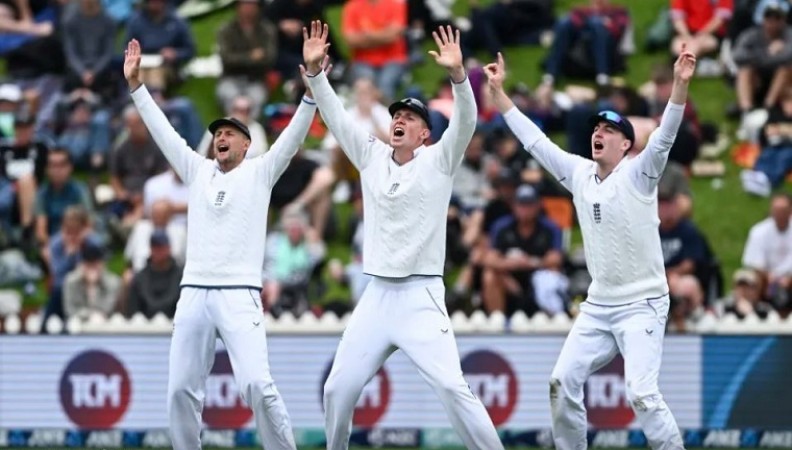
WELLINGTON: For the second consecutive day, rain came to New Zealand’s rescue in the second cricket test, saving it from an even greater mauling by England. On the 1st day the rain came after only 65 overs when England already was 315-3. With Harry Brook making 186 and Joe Root an unbeaten 153 in a 302-run partnership, England was able to declare its first innings at 435-8. And when the rain came again on Saturday, February 25 not long after tea, New Zealand was 138-7, still 297 behind. Tom Blundell was 25 and Tim Southee on 23.
The New Zealand squad's first innings was destroyed by James Anderson (3-37) and Jack Leach (3-45), who also sent the home team to the locker room in a light shower while hoping for a reprieve. As the rain started on the first day, Brook had completely dominated New Zealand and had scored 184, his highest test score and fourth century in five tests. Age 101 was Root.
On Saturday, Brook faced just seven balls before being dismissed for 186, but Root converted his 29th century into his 13th career score of at least 150 runs. England seemed to be hurrying to declare from the outset of the day, and it did so this time after 87 overs.
Root stated, "I definitely felt like I found a way to control the issue throughout this game. At the time I did, it was wonderful to be able to simply calm down the situation and wrest some momentum back in our direction.
When you're batting at the other end of Brook right now, he's really simplifying your life. It was pleasant to bounce off of him, and we managed to cool things down in the dressing room. A collaboration like that will always make everything easier.
As he or Stuart Broad had done in England's victory in the first test at Mount Maunganui, James Anderson once more tore up the New Zealand top order. With just the sixth ball of the New Zealand innings, he eliminated Devon Conway (0), and he subsequently had Kane Williamson (4 balls) and Will Young (2).
Tom Latham led New Zealand's comeback, scoring 35 runs to bring the score to 60-4 when he swiped at Leach and was caught by Root at slip as the ball touched the top of his glove.
In order to once again emphasise England's superiority, Leach then removed Daryl Mitchell (age 13) and Henry Nicholls (30). Before the rain arrived, Southee and Blundell contributed a little to keeping New Zealand steady.
Although England was always rushing to declare, the New Zealand bowlers had some success early on the second day and with the older ball.
Even before New Zealand took the second new ball after 80 overs, the Basin Reserve ground appeared to have been freshened by the light rain that fell during the night. There was movement for the seamers and turn for spinner Michael Bracewell.
Ironically, Brooks' powerful inning came to an end. He made a rare straight-bat defence against a Matt Henry ball, but the ball carried back to the bowler, who made a juggled catch because of his sweet contact.
The way Ben Foakes was fired was also awkward. After trying to flick a Bracewell ball down the leg side, the England wicketkeeper lost his footing, fell forward, and was run out by his opposite Tom Blundell.
Neil Wagner's ball was caught by Ben Stokes outside leg stump, but he was only able to spoon it to the replacement fielder Scott Kuggeleijn. Henry defeated Ollie Robinson as well, finishing with 4-100. Conway was dismissed in Anderson's first over, the finest test bowler in the world, adding to his 7-54 total from the first test.
Without making much noise, the ball slipped past Conway's bat's outside edge. Nevertheless, Foakes and the slip field intervened and persuaded Stokes to reconsider the call for not out. Replays amplified the slight edge. Anderson threw a ball that was wide of off-stump and heading away, and Williamson, who has been consistently out of form, dangled his bat at it, giving Foakes an easy catch.